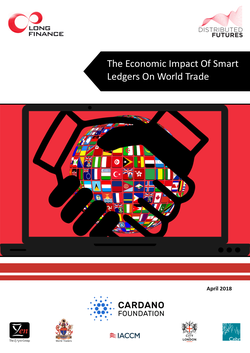Got To Be Smart, Going To The Houses Of Parliament...
Friday, 04 May 2018By James Pitcher

Long Finance's Distributed Futures research programme launched its latest report at a reception at the Houses of Parliament recently, and then in more detail at The Furniture Makers Hall. The report, entitled, “The Economic Impact Of Smart Ledgers On World Trade”, was the latest in a series of exciting projects in the programme.
The launch events were attended by over 200 people, including members of parliament, commonwealth delegates, cryptocurrency issuers and followers, technologists, bankers, economists, regulators, trade organisations, lawyers and well, just about anyone that’s anyone.
And they weren’t there, smartly dressed, just for the canapes, historical tour and distinguished speakers. They wanted to see if those smart people at Z/Yen and Cebr (The Centre for Economics and Business Research) had come up with some interesting findings.
And they had. Cebr’s ‘conservative’ estimates suggested that MDL technology could:
- Boost trade in goods by at least $35 billion, maybe even up to $170 billion;
- Boost world GDP by up to $20 billion;
- Add nearly a million people to the global workforce, boosting wages and living standards worldwide;
- That GDP boost is associated with $3 to $6 more GDP per average global worker;
- Pretty smart, when considering that many of the world’s poorest people live on less than $2 a day;
- And this is just goods, imagine what the predictions would be for services.
So, what’s going on?
Well, we have Smart Phones, Smart Cards, Smart Cars, Smart Criteria, Smart Homes, S.M.A.R.T. goal setting (don’t ask) and so on. In fact, just about anything that uses electricity now comes with a ‘Smart’ prefix. And now we have Smart Ledgers, also known as mutual distributed ledgers (MDLs), the technology that, among other things, underpins the blockchain technology, that among other things, underpins cryptocurrencies. Did you know there are over 1,500 of those now by the way?
So, what are Smart Ledgers, and how do you get to understand more about their impact and the opportunities that are out there?
Smart Ledgers are based on a combination of mutual distributed ledgers (multi-organisational databases with a super audit trail) with embedded programming and sensing, thus permitting semi-intelligent, autonomous transactions.
Smart Ledgers are touted as a technology for fair play in a globalised world. There are numerous projects building trade systems using this technology with announcements from governments, shipping firms, large IT firms, and the like.
Michael Mainelli, Executive Chairman of the Z/Yen Group wrote in his Preface to the report: "Trade reaps economic benefits from specialisation and comparative advantage, creates prosperity, distributes success and wealth, and collectively enriches all of our societies and communities. Hopefully, knowing the scale of relative benefits can help speed adoption of some boring technology – ‘multi-organisational databases with a super audit trail’ - for the benefit of all of us".
We would be delighted if you would join our Distributed Futures community, to learn much more about Smart Ledgers. You can register for events, read publications or simply sign up for emails and notifications at the Long Finance Website.